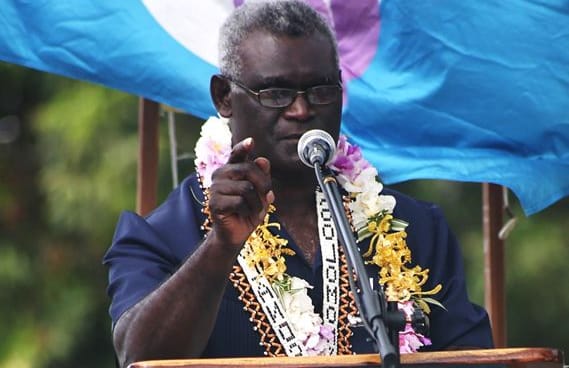Solomon Islands' prime minister Manasseh Sogavare has lashed out at his critics and vowed to pass a revised anti-corruption bill during the next sitting of parliament.
Mr Sogavare received widespread criticism this week when he withdrew a much anticipated anti-corruption bill which he tabled in 2016 only to have it stall after its first reading.
The opposition group voted against its withdrawal calling it a slap in the face of Solomon Islanders standing against corruption.
Manasseh Sogavare has accused them of being against the strengthening of the proposed legislation, which was the reason he gave for its withdrawal.
Koroi Hawkins has been following the story and spoke with Johnny Blades who began by asking him about the anti-corruption bill itself.

Solomon Islands' prime minister Manasseh Sogavare.
Photo: Supplied
Transcript
KOROI HAWKINS: Basically it is the flagship bill of his promise when he was elected as prime minister in 2014. He promised Solomon Islanders that he would take the fight to corruption. He would bring in legislations, regulation that would make corruption at least harder to do or bring in stronger punishments for corruption. And he had widespread support for this. Like he was really supported by civil society, members of the public when he brought it in. But it is just he has found hard since he brought it to parliament last year to get it through.
JOHNNY BLADES: If passed what changes would the law have brought in?
KH: So it is part of a few pieces of legislation there is a whistleblowers bill which is in parliament, he hasn't withdrawn that, there is an ombudsman's bill which has been passed and this one was to bring in the framework for the establishment of an independent commission against corruption. So that was what the bill was supposed to have achieved if it had been passed. But he has now withdrawn it from parliament supposedly to bring it back stronger and pass it in the next sitting. Which is what he is promising now.
JB: So is corruption a really big problem in Solomon Islands?
KH: It has been described as systemic so it is part of almost the fabric of the way society works. So there has been references to the wantok system that is the system of caring for your blood your family your tribe and that being part of the way at a social and cultural level Solomon Islands' works. When it comes to official appointments, official systems it translates to corruption or networking people would call it in different places. But I was there I went over in June for the withdrawal of the Regional Assistance Mission to Solomon Islands and spoke with some of the foreign business owners there and they said it was almost an expectation that you had to do something for someone in a place of power in a position where you needed something from them in government in order to get what you wanted done in good time. Or even you could jump the queue by doing that and so businesses just do it.
JB: It is just the way things happen?
KH: Yes it is just business as usual the way he said it. And he was quite open about it and the way that people were openly talking about corrupt practices sort of point to it actually being a problem that needs to be regulated for that needs stronger legislation to try and curb it and I guess this is what people are hoping this new law if it is brought back to parliament if it is passed will achieve.
To embed this content on your own webpage, cut and paste the following:
See terms of use.


